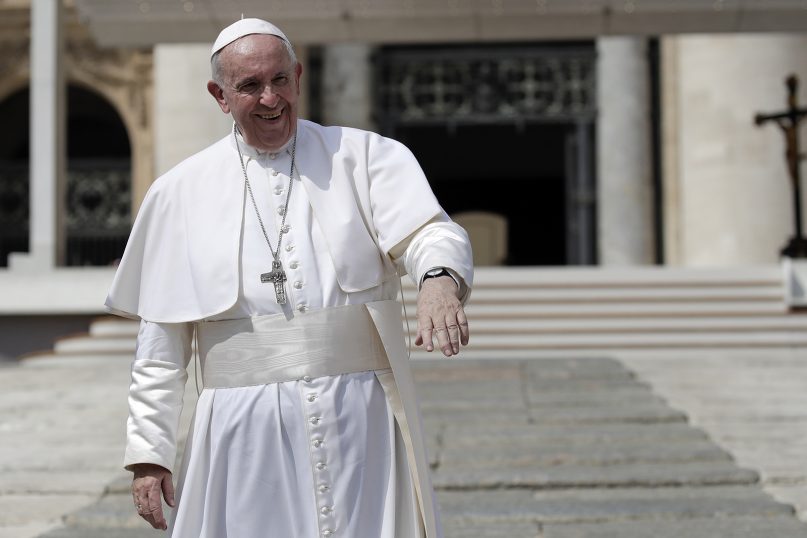(RNS) — Thirty years ago, Patriarch Bartholomew of Constantinople put Sept. 1 on the Orthodox calendar as the World Day of Prayer for the Care of Creation. Last month, Pope Francis did the same for the Catholic Church and on Sunday he marked the occasion by issuing a new message on climate change.
Moving beyond his 2015 encyclical “Laudato Si’,” Francis called for “prophetic actions” to spur governments to undertake “drastic measures” to achieve zero net greenhouse gas emissions and keep average global warming at 1.5 degrees Celsius above pre-industrial levels. He points to the United Nations Climate Action Summit on Sept. 23 as a place to show political will and signals that next month’s Amazon Synod of Bishops will itself address climate.
To be sure, Francis is not the first pope to sound the alarm on the environment. John Paul II and Benedict XVI both did so in a number of notable statements.
But Francis has his own theological take, distinct from his predecessors’ even as it builds on long-standing Christian teaching.
RELATED: As Amazon burns, Vatican prepares for summit on region’s sustainability
John Paul cast the ecological crisis in terms of original sin. As he wrote in his 1990 Message for the Celebration of the World Day of Peace:
Made in the image and likeness of God, Adam and Eve were to have exercised their dominion over the earth (Gen 1:28) with wisdom and love. Instead, they destroyed the existing harmony by deliberately going against the Creator’s plan, that is, by choosing to sin. This resulted not only in man’s alienation from himself, in death and fratricide, but also in the earth’s “rebellion” against him (cf. Gen 3:17-19; 4:12). All of creation became subject to futility, waiting in a mysterious way to be set free and to obtain a glorious liberty together with all the children of God (cf. Rom 8:20-21).
Likewise Benedict, in his 2010 World Day of Peace message, wrote, “The harmony between the Creator, mankind and the created world, as described by Sacred Scripture, was disrupted by the sin of Adam and Eve, by man and woman, who wanted to take the place of God and refused to acknowledge that they were his creatures.”
That is not Francis’ way. Rather than blame the environmental crisis on humanity’s fallen state, he celebrates creation and emphasizes how nature brings us closer to God.
“We are beloved creatures of God, who in his goodness calls us to love life and live it in communion with the rest of creation,” he writes. “This is the season for letting our prayer be inspired anew by closeness to nature, which spontaneously leads us to give thanks to God the Creator.”
Where John Paul and Benedict cast creation as a broken thing in need of Christ’s restorative mission, Francis embraces it as a wonderful gift for all people regardless of their present spiritual condition: “Each Christian man and woman, every member of the human family, can act as a thin yet unique and indispensable thread in weaving a network of life that embraces everyone.”
For his main source, Francis turns to Bonaventure, greatest of the 13th-century Franciscan theologians.
Saint Bonaventure, that eloquent witness to Franciscan wisdom, said that creation is the first “book” that God opens before our eyes, so that, marveling at its order, its variety and its beauty, we can come to love and praise its Creator (cf. Breviloquium, II, 5, 11). In this book, every creature becomes for us “a word of God” (cf. Commentarius in Librum Ecclesiastes, I, 2). In the silence of prayer, we can hear the symphony of creation calling us to abandon our centeredness in order to feel embraced by the tender love of the Father and to share with joy the gifts we have received.
The metaphor of nature as God’s first book goes back to the early church fathers and was later picked up and embraced by the Calvinist tradition as well. “It is evident,” wrote Calvin, “that all creatures, from those in the firmament to those which are in the center of the earth, are able to act as witnesses and messengers of his glory to all men.”
Francis’ Franciscan view of God as immanent in creation goes beyond that. It is intrinsic to the spirituality of his own Jesuit order, which aims at finding God in all things. And while it is a far cry from conceiving of the earth as a goddess to be worshipped, it enables him to speak to those who do.






